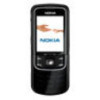Nokia 8600 Luna User Guide - Page 41
General information, Overview of functions, Access codes - edition
 |
View all Nokia 8600 Luna manuals
Add to My Manuals
Save this manual to your list of manuals |
Page 41 highlights
General information ■ Overview of functions Your phone provides many functions that are practical for daily use, such as text and multimedia messaging, calendar, clock, alarm clock, radio, music player, and built-in camera. Your phone also supports the following functions: • Plug and play online service to get the configuration settings. See "Plug and play service," p. 13, and "Configuration settings service," p. 9. • Active standby. See "Active standby," p. 17. • Audio messaging. See "Nokia Xpress audio messaging," p. 29. • Instant messaging. See "Instant messaging," p. 32. • E-mail application. See "E-mail application," p. 30. • Enhanced voice dialing. See "Enhanced voice dialing," p. 20 and "Voice commands," p. 52. • Presence-enhanced contacts. See "My presence," p. 46. • Java 2 Platform, Micro Edition (J2METM). See "Applications," p. 22. ■ Access codes Security code The security code (5 to 10 digits) helps to protect your phone against unauthorized use. The preset code is 12345. To change the code, and to set the phone to request the code, see "Security," p. 57. PIN codes The personal identification number (PIN) code and the universal personal identification number (UPIN) code (4 to 8 digits) help to protect your SIM card against unauthorized use. See "Security," p. 57. The PIN2 code (4 to 8 digits) may be supplied with the SIM card and is required for some functions. The module PIN is required to access the information in the security module. See "Security module," p. 43. The signing PIN is required for the digital signature. See "Digital signature," p. 44. PUK codes The personal unblocking key (PUK) code and the universal personal unblocking key (UPUK) code (8 digits) is required to change a blocked PIN code and UPIN code, respectively. The PUK2 code (8 digits) is required to change a blocked PIN2 code. If the codes are not supplied with the SIM card, contact your local service provider for the codes. 8















